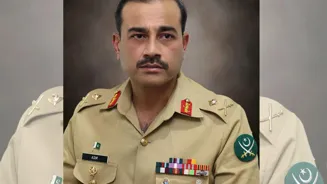Pakistan Army Chief Field Marshal Asim Munir has a plan for the country’s reserves. This comes as the United States shows an interest in the South Asian nation's rare earth minerals and its "massive oil reserves".
Let’s take a closer look.
Munir’s plan
Pakistan Army chief Asim Munir has unveiled a plan to change the country’s fortunes through its "rare earth treasure".
In an interaction between Munir and Pakistani writer Suhail Warraich, published by Jang media, the Army chief specifically brought up the Reko Diq mining project in the conflict-ridden Balochistan province.
He predicted that Pakistan could mint at least $2 billion annually from next year, with profits likely to increase year after year.
“Pakistan has a rare earth treasure; with this treasure, Pakistan's debt will also be reduced, and Pakistan will soon be counted among the most prosperous societies,” Munir was quoted as saying.
The Reko Diq mine is one of the world's largest underdeveloped copper and gold deposits. Its presence in insurgency-hit Balochistan, however, adds a challenge for the mining project.
Baloch leaders already accuse Islamabad of draining the region's national resources.
The Reko Diq mining project is jointly owned by the governments of Pakistan and Balochistan, as well as Canada-headquartered Barrick Gold. The company is seeking funding for the project from international lenders.
US interest in Pakistan’s minerals
Munir’s reported remarks come amid growing interest in Pakistan's resources by the US under President Donald Trump.
As per reports, Washington and Islamabad have discussed the extraction of rare earth elements. This comes as the US has ramped up efforts to seek alternatives to China, which currently dominates global rare earth supply chains.
Rare earths are 17 metallic elements, consisting of scandium, yttrium and the lanthanides. While these materials are found throughout the Earth’s crust, extracting and processing them is costly and environmentally damaging. From the automotive industry to defence, permanent magnets made with rare earth elements (REEs) are essential across sectors.
The US military is heavily reliant on rare earths from China. Washington now wants to reduce this dependence on Beijing.
Earlier this month, the Washington Post reported that Trump’s outreach to Islamabad is “less about oil than minerals.” In recent months, the US and Pakistan's ties have improved.
Munir has visited the US twice in the past few months for high-level engagements. Pakistan has also nominated Trump for the Nobel Peace Prize, which the American president publicly covets.
On Pakistan’s Independence Day, US Secretary of State Marco Rubio said Washington was keen to “explore new areas of economic cooperation, including critical minerals and hydrocarbons.” His statement came after the announcement of a new trade agreement between the two countries to lower tariffs and attract US investment in Balochistan’s mining projects.
This shift comes amid a strain in relations between India and the US. Trump has announced 50 per cent tariffs on Indian exports, of which a 25 per cent levy is the "penalty" for buying Russian oil.
On the other hand, Pakistan has received its first-ever crude shipment from the US under a new trade deal.
In a recent post on Truth Social, the US president announced, "Pakistan and the United States will work together on developing their massive Oil Reserves .”
“We are in the process of choosing the oil company that will lead this partnership. Who knows, maybe they’ll be selling oil to India some day!” Trump added.
The China factor
Even as Pakistan gets closer to the US, it cannot ignore the China factor. Beijing has invested billions in Pakistan through the China-Pakistan Economic Corridor (CPEC).
Islamabad has to maintain a balancing act: welcome the US support without isolating its all-weather ally, China. Munir has reportedly hinted at his strategy of dealing with the two countries.
“We will not sacrifice one friend for the other,” he was quoted as saying by Jang media.
With inputs from agencies















